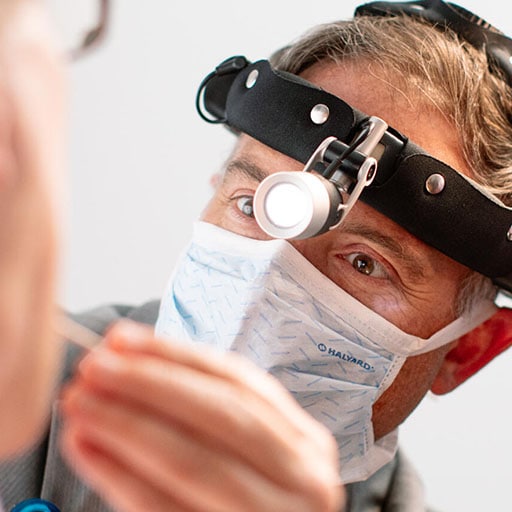Discovering the Area of Otolaryngology: What to Expect When You Speak With an ENT
Otolaryngology, frequently referred to as ENT, encompasses the medical diagnosis and treatment of nose, ear, and throat conditions. For those experiencing associated issues, speaking with an ENT professional can give clarity and alleviation. Recognizing what to anticipate during such appointments is essential for efficient interaction and treatment. This overview will certainly outline crucial aspects of the ENT experience, consisting of usual factors for gos to and the processes associated with medical diagnosis and treatment.

Understanding Otolaryngology: An Overview
Otolaryngology, frequently referred to as ENT (Nose, ear, and throat) medication, is a specialized branch of medicine that focuses on the diagnosis and treatment of problems influencing these crucial locations of the body. This field incorporates a variety of disorders, including those pertaining to hearing, balance, respiratory function, and speech. Otolaryngologists are educated to take care of both medical and medical therapies, using sophisticated techniques and technologies. Their experience expands past typical disorders, resolving issues such as allergic reactions, sinus infections, and hearing loss. Furthermore, they play a critical duty in the administration of head and neck cancers, providing thorough treatment tailored to private client needs. Generally, otolaryngology continues to be vital for keeping health and wellness and lifestyle in affected individuals.
Common Factors to See an ENT Specialist
Numerous people seek the proficiency of an ENT professional for a selection of reasons, reflecting the diverse nature of conditions that impact the ear, throat, and nose. Typical issues consist of persistent sinus problems, which typically causes relentless nasal blockage and face pain. Allergies and their associated symptoms, such as itching and sneezing, also trigger check outs to these experts (Sinus). Hearing loss, whether unexpected or steady, is one more considerable factor for consultation. Furthermore, individuals may look for examination for throat problems, including persistent hoarseness or ingesting problems. Rest apnea, defined by disrupted breathing throughout sleep, is often resolved by ENT professionals. Each of these problems highlights the importance of specialized care in handling complicated ENT-related health and wellness issues
Preparing for Your ENT Visit
When preparing for an ENT appointment, it is vital to collect appropriate information and consider any details concerns. Individuals need to compile a thorough medical history, consisting of previous ear, nose, or throat concerns, surgical procedures, and present drugs. Documenting signs-- such as frequency, severity, and period-- can give useful understandings for the ENT expert. In addition, individuals need to prepare a listing of inquiries they want to ask, making certain that all concerns are attended to during the go to. Bringing along any kind of appropriate medical records or test results can additionally help the ENT in comprehending the client's problem. Ultimately, clients ought to validate their consultation details, consisting of time, place, and day, to lessen any final confusion. Proper preparation can boost the performance of the assessment and result in better end results.
What to Expect Throughout the Appointment
As the assessment begins, the person can expect to take part in a thorough conversation with the ENT specialist concerning their signs and symptoms and medical background. The specialist will ask about the duration, frequency, and extent of symptoms such as hearing loss, nasal congestion, or aching throat. In addition, the individual's previous medical conditions, drugs, and any kind of pertinent household background will certainly be examined, aiding the professional in developing have a peek at this website a total understanding of the person's health and wellness. The ENT may additionally ask concerning way of living factors, such as direct exposure to toxic irritants or allergens. This open dialogue establishes a foundation for the appointment, ensuring that the individual's issues are dealt with and establishing the stage for any kind of needed assessments or suggestions for therapy.
Diagnostic Tests and Treatments in Otolaryngology
A variety of diagnostic examinations and treatments are important in otolaryngology to properly evaluate and identify problems impacting the ear, throat, and nose. Usual tests consist of audiometry, which measures hearing function, and tympanometry, assessing middle ear stress. Nasal endoscopy enables visualization of the nasal flows and sinuses, while laryngoscopy checks out the throat and vocal cords. Imaging techniques, such as CT scans and MRIs, give in-depth sights of head and neck structures. Allergy screening may also be carried out to identify triggers for sinus or respiratory system problems. These diagnostic devices enable ENT specialists to develop a here are the findings detailed understanding of clients' conditions, guaranteeing customized and efficient administration strategies. Correct medical diagnosis is crucial for successful therapy outcomes in otolaryngology.
Therapy Choices Supplied by ENT Specialists
ENT professionals offer a range of treatment options tailored to attend to certain conditions influencing the throat, nose, and ear. These treatments range from conventional strategies, such as medicine and way of living alterations, to even more intrusive treatments. For example, allergies might be managed with antihistamines or immunotherapy, while persistent sinus problems might require nasal corticosteroids or sinus surgical procedure. For hearing loss, ENT professionals typically suggest listening device or medical interventions like cochlear implants. In cases of throat disorders, alternatives can consist of speech therapy or surgeries to eliminate obstructions. Additionally, they might provide support for taking care of sleep apnea, consisting of making use of CPAP gadgets or surgical interventions. In general, the objective is to boost clients' lifestyle with customized treatment and effective treatment strategies.
When to Look For Follow-Up Care With an ENT
Identifying when to seek follow-up care with an ENT specialist is important for managing recurring signs and symptoms or issues connected to throat, nose, and ear problems. Patients need to take into consideration setting up a follow-up appointment if signs and symptoms linger in spite of preliminary therapy, such as chronic ear pain, nasal congestion, or throat discomfort. Changes in hearing, equilibrium problems, or unusual nasal discharge may additionally require additional assessment. Additionally, if a person experiences side results from recommended drugs or has undergone a procedure, follow-up treatment is necessary to check recovery and deal with any kind of worries. Timely consultations can guarantee reliable management of conditions, stop potential complications, and provide peace of mind relating to one's wellness. Looking for follow-up treatment advertises proactive wellness administration in otolaryngology.
Regularly Asked Questions

What Certifications Should I Look for in an ENT Expert?
When looking for an ENT professional, one must search for board certification, relevant experience, and strong patient evaluations. In addition, effective communication skills and a thoughtful click here for info strategy can greatly improve the total therapy experience.
Just how Do I Select the Right ENT for My Demands?
Choosing the best ENT expert entails evaluating their qualifications, experience, and individual evaluations (ENT). It is important to consider their interaction style and technique to therapy, ensuring they line up with the individual's certain health and wellness requirements and choices
Exist Any Type Of Risks Related To ENT Procedures?
The dangers related to ENT treatments might consist of infection, blood loss, anesthesia problems, and prospective damages to surrounding structures. Clients need to discuss these dangers with their doctor to recognize private concerns and assurance educated choices.
Exactly How Can I Handle Anxiousness Prior To My ENT Visit?
To take care of anxiety prior to a consultation, people can exercise deep breathing workouts, imagine positive results, prepare concerns beforehand, and look for support from buddies or family, cultivating a feeling of reassurance and calmness.
What Should I Do if I Experience Adverse Effects From Treatment?
If negative effects from therapy happen, the person needs to without delay report them to their health care company. Changes to therapy or extra interventions might be required to guarantee security and effectiveness in handling their problem - Sinus. As the assessment starts, the individual can expect to involve in a complete conversation with the ENT specialist concerning their symptoms and clinical history. These analysis devices allow ENT professionals to create a comprehensive understanding of individuals' conditions, making sure tailored and efficient management plans. ENT experts supply a selection of treatment options customized to attend to certain problems affecting the ear, throat, and nose. When seeking an ENT expert, one should look for board accreditation, relevant experience, and solid client testimonials. Selecting the best ENT professional includes evaluating their credentials, experience, and client reviews